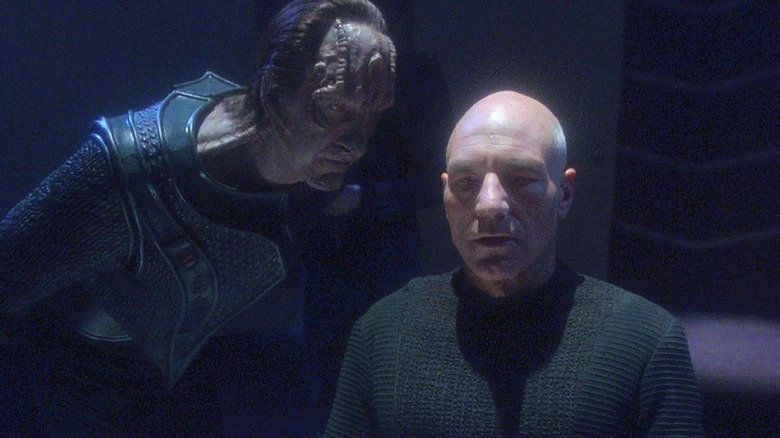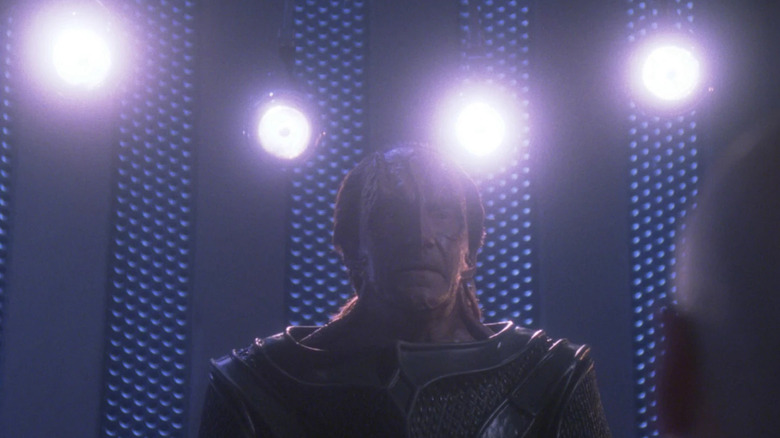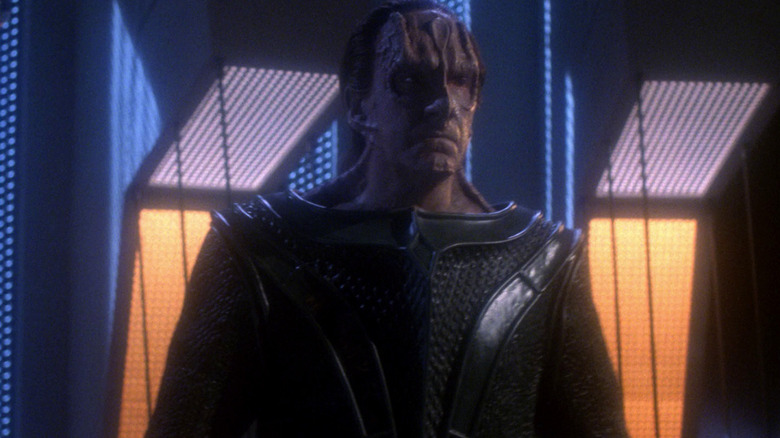A Classic Star Trek Episode Allowed Patrick Stewart To Be Tortured By His Hero
In the sixth season of "Star Trek: The Next Generation," in a two-part episode called "Chain of Command" (December 14 and 21, 1992), Captain Picard (Patrick Stewart) was released from his command of the U.S.S. Enterprise so that he may engage in a top-secret mission to a planet called Celtris III. His mission was to infiltrate a secret underground facility and locate a massively dangerous biological weapon that the Cardassians were said to be developing. The mission, however, was based on tainted intelligence, and there was no weapon. Instead, Picard is captured by a sadistic and terrifying Cardassian general named Madred (David Warner) who aims to torture Picard.
Madred didn't need information from Picard, however. The aim of Madred's cool and calculated infliction of pain seemed to be to break Picard's will, to merely prove that a stalwart and loyal officer could be snapped and conditioned. In a particularly vicious game, Madred illuminates four blinding spotlights right into Picard's eyes. He insists that Picard tell him there are five lights. This mirrors an element of George Orwell's "1984," which featured a regime that could dictate whatever "facts" it wanted to its citizens, including that 2 + 2 = 5. "Chain of Command" is perhaps the single most dramatically intense episode of "Next Generation."
In his new autobiography "Making It So: A Memoir," Stewart reveals that filming "Chain of Command" fulfilled a professional dream of his. Stewart was an enormous fan of David Warner's work, going all the way back to a 1965 production of "Hamlet" at the Royal Shakespeare Company. Stewart played the First Player in that production. Warner was 24 at the time, and Stewart was about 25. In 1992, 27 years later, the two finally got to work together again.
There are four lights
Patrick Stewart recalls being on the set of "Star Trek: The Next Generation" and not knowing that David Warner was going to play the part of Gul Madred. It came as a pleasant surprise when executive producer Rick Berman came on set to inform the actor that he would be reunited with an old colleague. "I was beside myself," Stewart said. "All but one of my scenes in the episode were to be with him, and he was going to torture me! I didn't feel worthy." And indeed, the scenario allowed both actors to dig deep and provide dark, on-edge performances. Stewart even recalled his reunion:
"When he arrived on the set, David was an absolute sweetheart, clearly delighted to be in 'Star Trek: The Next Generation.' I'll admit that it all felt a bit wrong, this dynamic. Through a strange and unlikely chain of events beginning with a last-minute invitation from David Rodes to perform at a UCLA event, I had become, in my forties and fifties, the leading actor in a major TV series. Now, here was the greatest star of the British stage when I was starting out, thrilled to be a guest actor on my show. Life is indeed strange."
Filming on "The Next Generation" went quickly, with a whole episode usually being knocked out in a matter of days. Warner, although a consummate professional, arrived on set only shortly before filming and didn't have much opportunity to learn his lines. Stewart said that his co-star had to read the bulk of his dialogue off of cue cards. He also noted that Warner was such a talented actor that no one would be able to tell. "[...H]e inhabited every character he played," Stewart added, "always delivering a performance that was truthful and real."
'Observing him in action was astounding'
David Warner passed away in 2022 at the age of 80 after a long and distinguished career. Always professional, he brought equal energy to complex characters like Hamlet while also appearing in a wide swath of pop fare like "TRON," "Time Bandits" and "Freakazoid!" "Chain of Command" was Warner's third appearance on "Star Trek," having previously appeared as a human diplomat in William Shatner's "Star Trek V: The Final Frontier" and as a Klingon chancellor in "Star Trek VI: The Undiscovered Country." Of the three, Gul Madred was the richest character and Warner's best performance. Stewart agrees. "Observing him in action was astounding," he said. "'Chain of Command' is beloved by the Trek faithful, and I think that our scenes together are a big reason."
At the end of the episode, Madred tells Picard that his ship has been destroyed (it hasn't) and that there's no hope. Picard has one final way to be free of torture: Announce that there are five lights. At that moment, Cardassian soldiers enter and inform Madred that his torture games have been called out and that Picard is to be freed. In a raspy voice, his skin pale, and his body wracked by continued damage, Picard yells that there are four lights. But ... did he see the five lights?
Rewatching the episode had Stewart running a gamut of emotions. He wrote:
"[B]y the time the episode concluded, I needed a moment to collect myself and let a range of emotions pass through me — pride in how good we were, exhaustion at how wrenching the material is, and sadness over how much I miss David."
Warner was Stewart's first role model in the acting world. How grand that they could work together.


